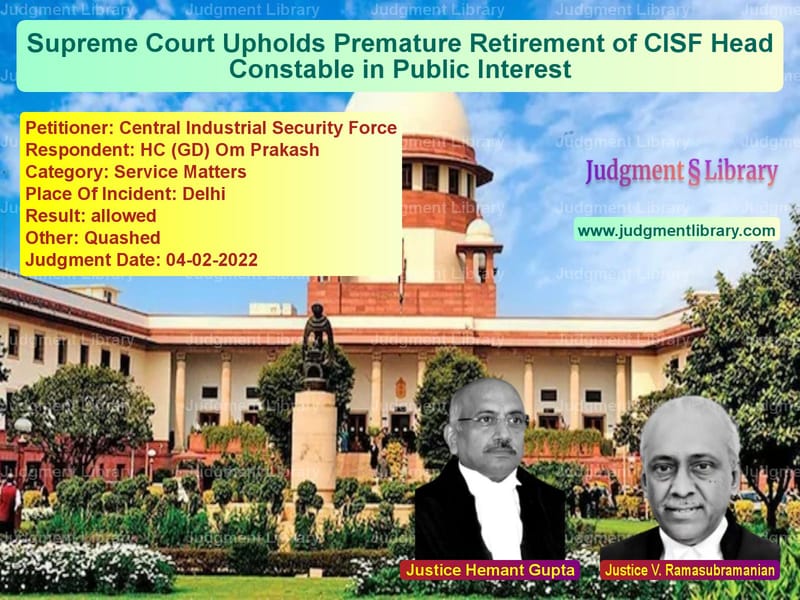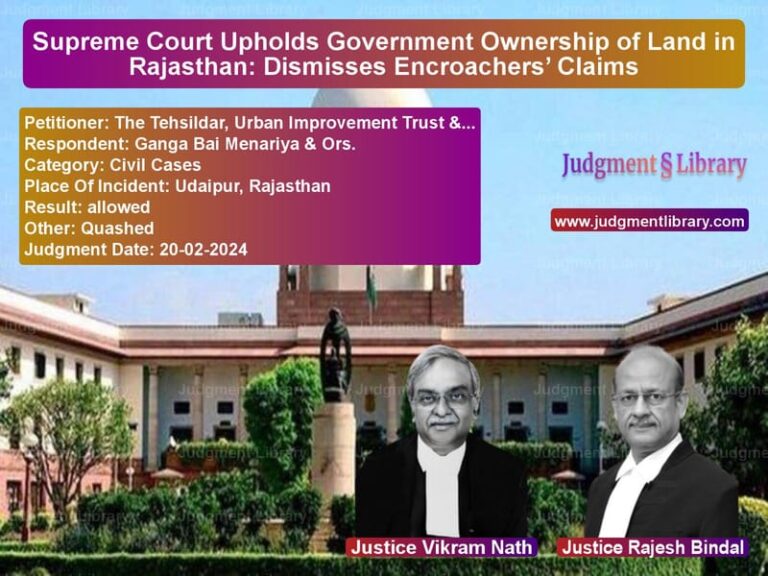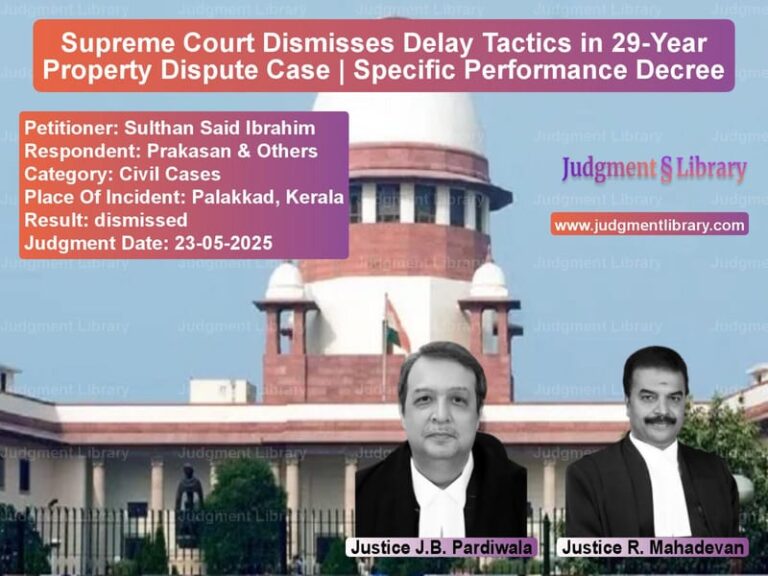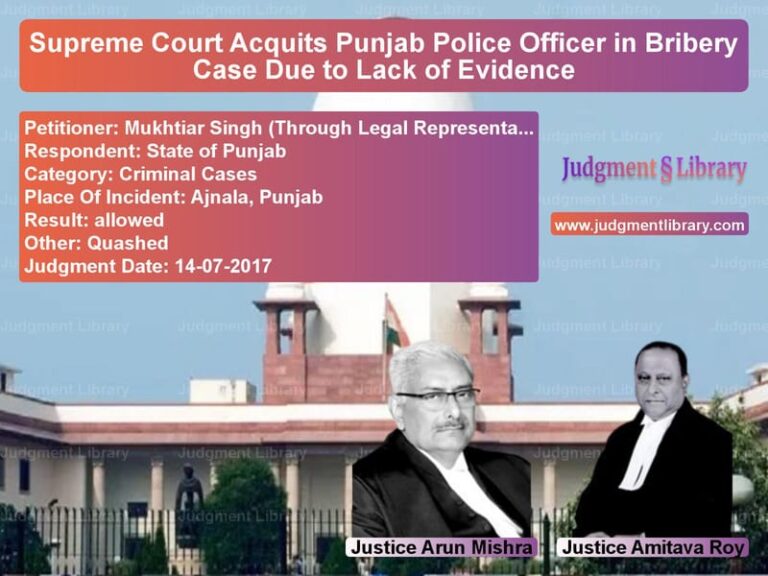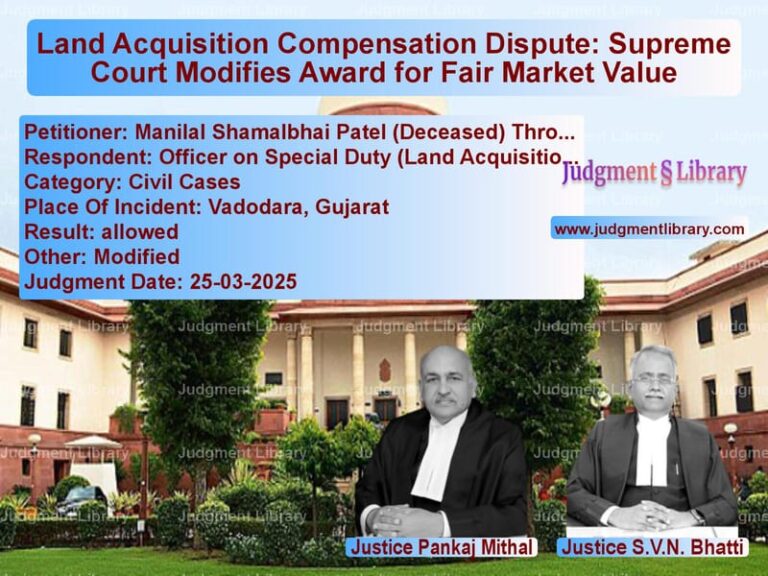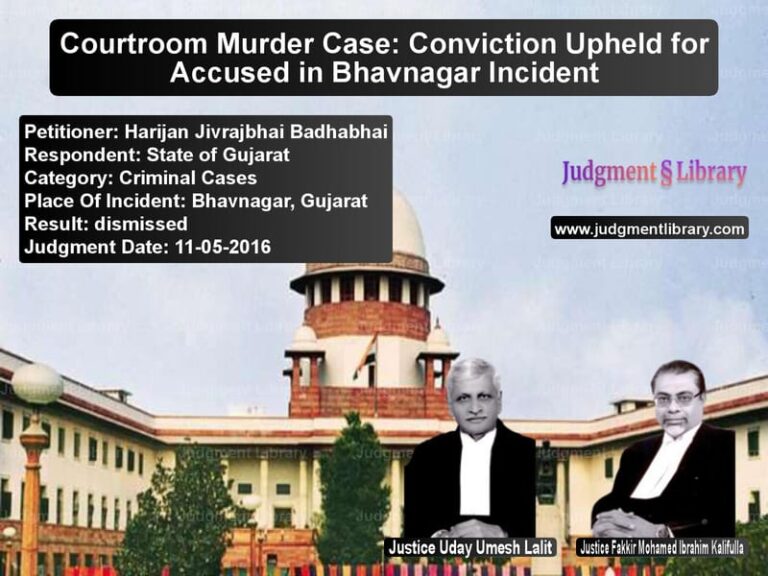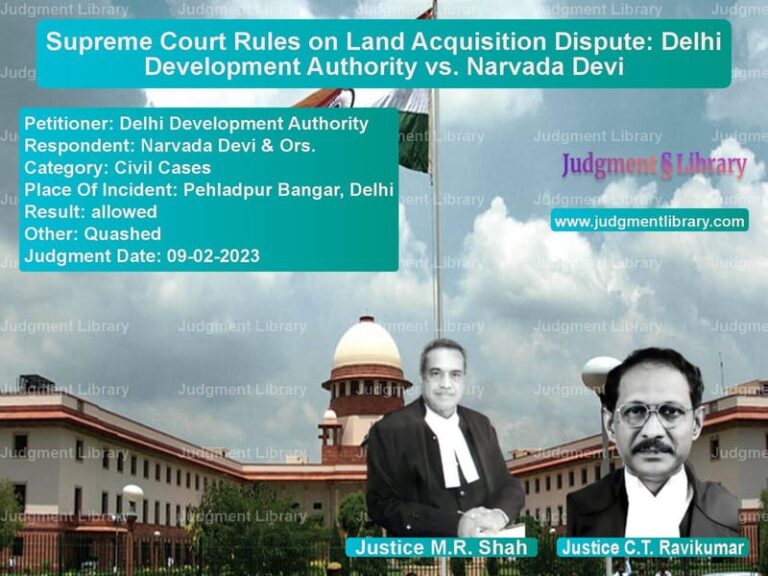Supreme Court Upholds Premature Retirement of CISF Head Constable in Public Interest
The Supreme Court, in the case of Central Industrial Security Force vs. HC (GD) Om Prakash, ruled on the legality of a premature retirement order issued against a CISF personnel. The case revolved around whether the respondent’s service record justified his compulsory retirement under Rule 56(j) of the Fundamental Rules and Rule 48(1)(b) of the CCS (Pension) Rules, 1972.
Background of the Case
Head Constable Om Prakash, the respondent, was prematurely retired from service on 16 August 2011, after completing 30 years of service. The order of retirement was based on recommendations from the Superannuation Review Committee, which found him unfit to continue in service beyond 30 years. The decision was challenged in the Delhi High Court, where a Division Bench set aside the retirement order on 14 October 2011, leading to an appeal by the CISF before the Supreme Court.
Arguments by the Parties
Petitioner’s Arguments (Central Industrial Security Force)
- The respondent had a history of multiple penalties for misconduct, including an incident in 1993 where he was caught receiving illegal gratification from a transporter.
- He had also been found guilty of sleeping on duty in 2005 and overstaying leave in 2008, for which he was fined.
- The Superannuation Review Committee conducted a fair assessment of his service record, including his Annual Confidential Reports (ACRs), before recommending his premature retirement.
- The High Court erred in ruling that only ACRs from the last five years should be considered.
Respondent’s Arguments (HC (GD) Om Prakash)
- The retirement order was punitive in nature and was based on minor penalties, which should not have influenced the decision.
- The ACRs from 1990 to 2009 were predominantly rated as ‘Good’ or ‘Very Good.’
- The ACR for 2010 was graded as ‘Average,’ but this rating was not communicated to him, making it unfair to consider it in the retirement decision.
- The High Court rightly set aside the retirement order, as it found no substantial reason to classify the respondent as ‘deadwood.’
Supreme Court’s Key Observations
1. Adverse Service Records Are Relevant
The Court emphasized that an order of premature retirement is not a punishment but a measure taken in public interest:
“The entire service record, including past disciplinary actions, can be considered when determining the suitability of an employee for continued service.”
2. Previous Misconducts Can Influence Retirement Decisions
The Supreme Court held that an employee’s past infractions, even those preceding a promotion, are relevant in assessing whether they should be retained:
“The nature of the misconduct and its recurrence are factors that indicate inefficiency and lack of discipline, justifying compulsory retirement.”
3. ACR Ratings Are Not the Sole Determinants
The Court rejected the argument that only the last five years of ACRs should be considered:
“The High Court misdirected itself in disregarding past disciplinary actions and earlier ACRs, which provided a complete picture of the respondent’s service conduct.”
4. Uncommunicated ACR Ratings Can Be Considered
The Court clarified that even if an ACR rating was not communicated to the employee, it could still be considered in retirement decisions:
“The rule of communication applies in cases of promotions, but for retirement decisions, the entire service record must be examined holistically.”
Final Judgment
The Supreme Court ruled as follows:
- The appeal by CISF was allowed.
- The Delhi High Court’s order setting aside the retirement was quashed.
- The premature retirement of HC (GD) Om Prakash was upheld as being in the public interest.
Impact of the Judgment
This ruling has significant implications for service matters and government employment policies:
- Reaffirms discretionary power of authorities: The ruling strengthens the power of review committees to retire employees in public interest.
- Emphasizes holistic service assessment: Past infractions, even before promotions, can be taken into account.
- Limits judicial interference: Courts should not interfere in administrative decisions unless there is clear mala fide intent.
- Clarifies ACR consideration: Even uncommunicated adverse ACRs can be factored into premature retirement decisions.
The Supreme Court’s decision upholds the importance of maintaining discipline in security forces and reinforces the principle that public interest must prevail in employment decisions.
Petitioner Name: Central Industrial Security Force.Respondent Name: HC (GD) Om Prakash.Judgment By: Justice Hemant Gupta, Justice V. Ramasubramanian.Place Of Incident: Delhi.Judgment Date: 04-02-2022.
Don’t miss out on the full details! Download the complete judgment in PDF format below and gain valuable insights instantly!
Download Judgment: central-industrial-s-vs-hc-(gd)-om-prakash-supreme-court-of-india-judgment-dated-04-02-2022.pdf
Directly Download Judgment: Directly download this Judgment
See all petitions in Disciplinary Proceedings
See all petitions in Public Sector Employees
See all petitions in Termination Cases
See all petitions in Judgment by Hemant Gupta
See all petitions in Judgment by V. Ramasubramanian
See all petitions in allowed
See all petitions in Quashed
See all petitions in supreme court of India judgments February 2022
See all petitions in 2022 judgments
See all posts in Service Matters Category
See all allowed petitions in Service Matters Category
See all Dismissed petitions in Service Matters Category
See all partially allowed petitions in Service Matters Category

